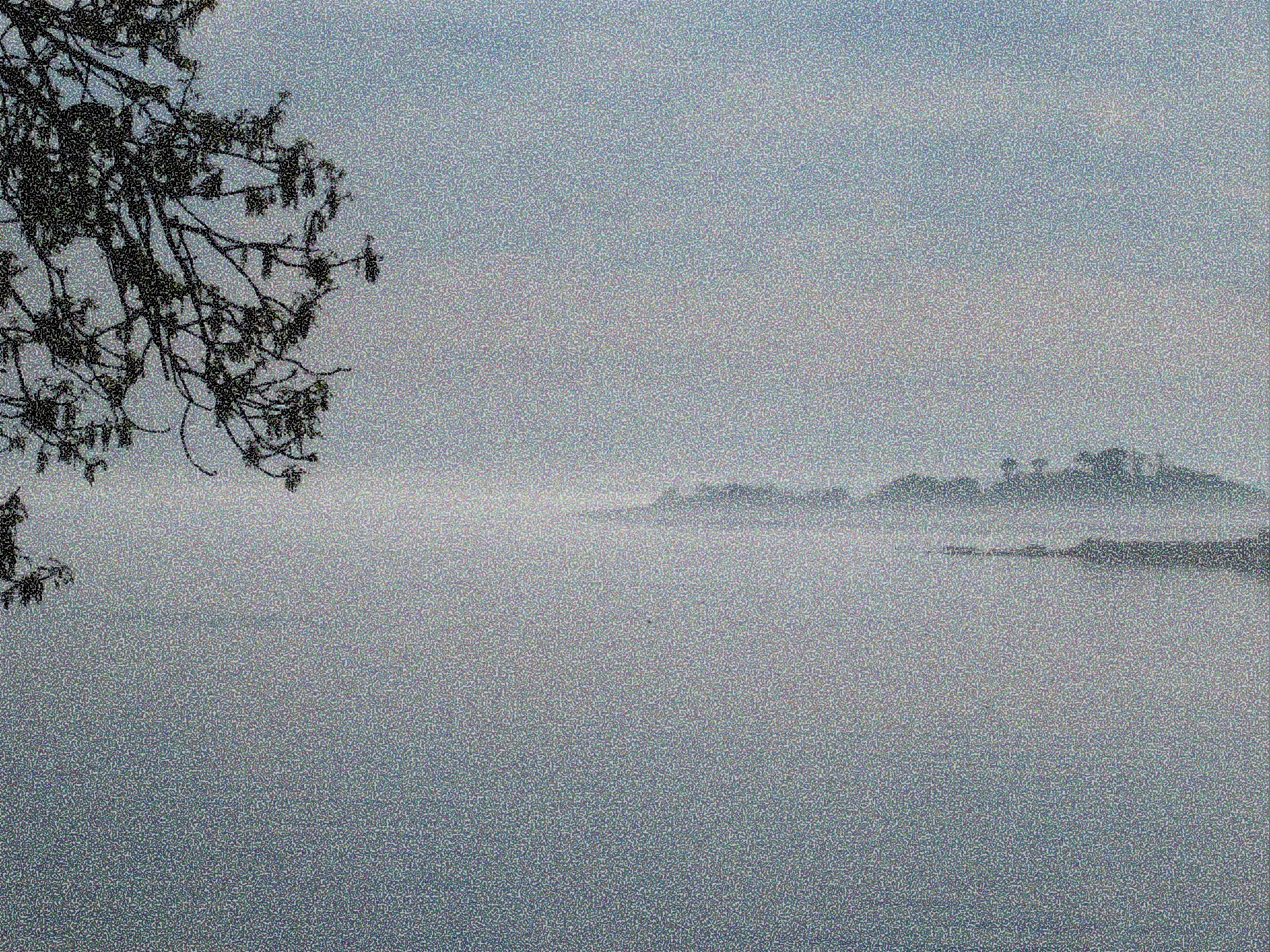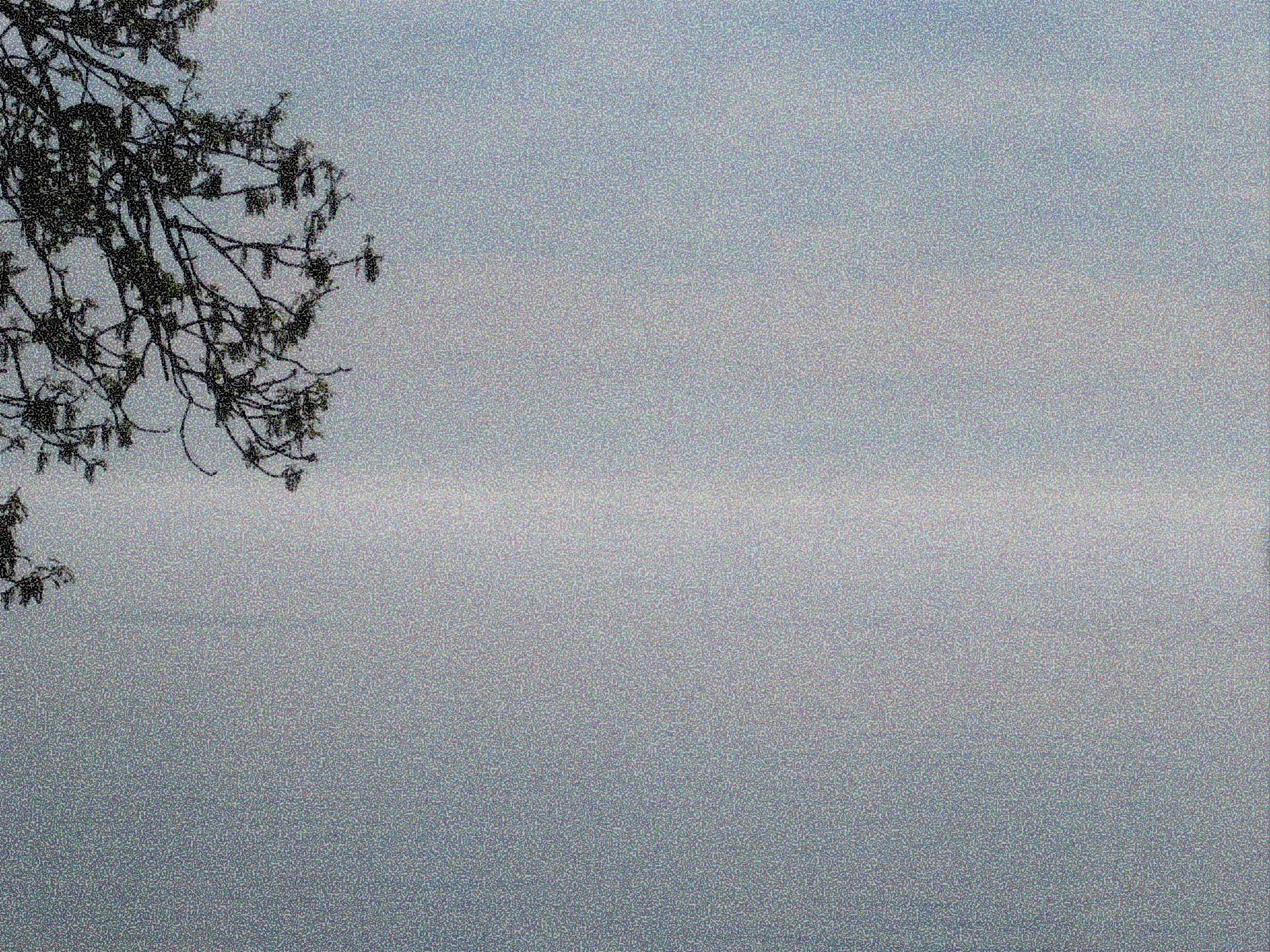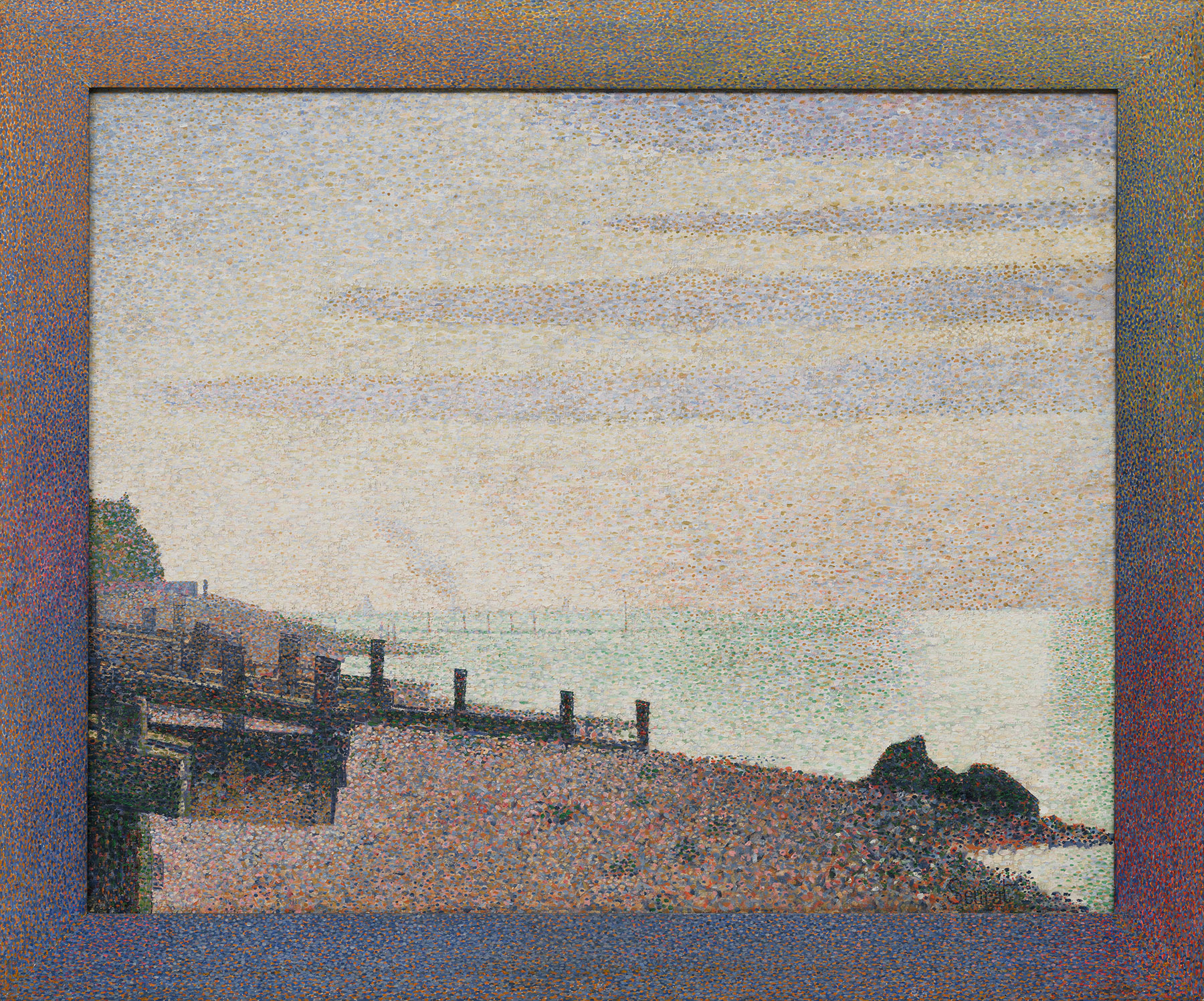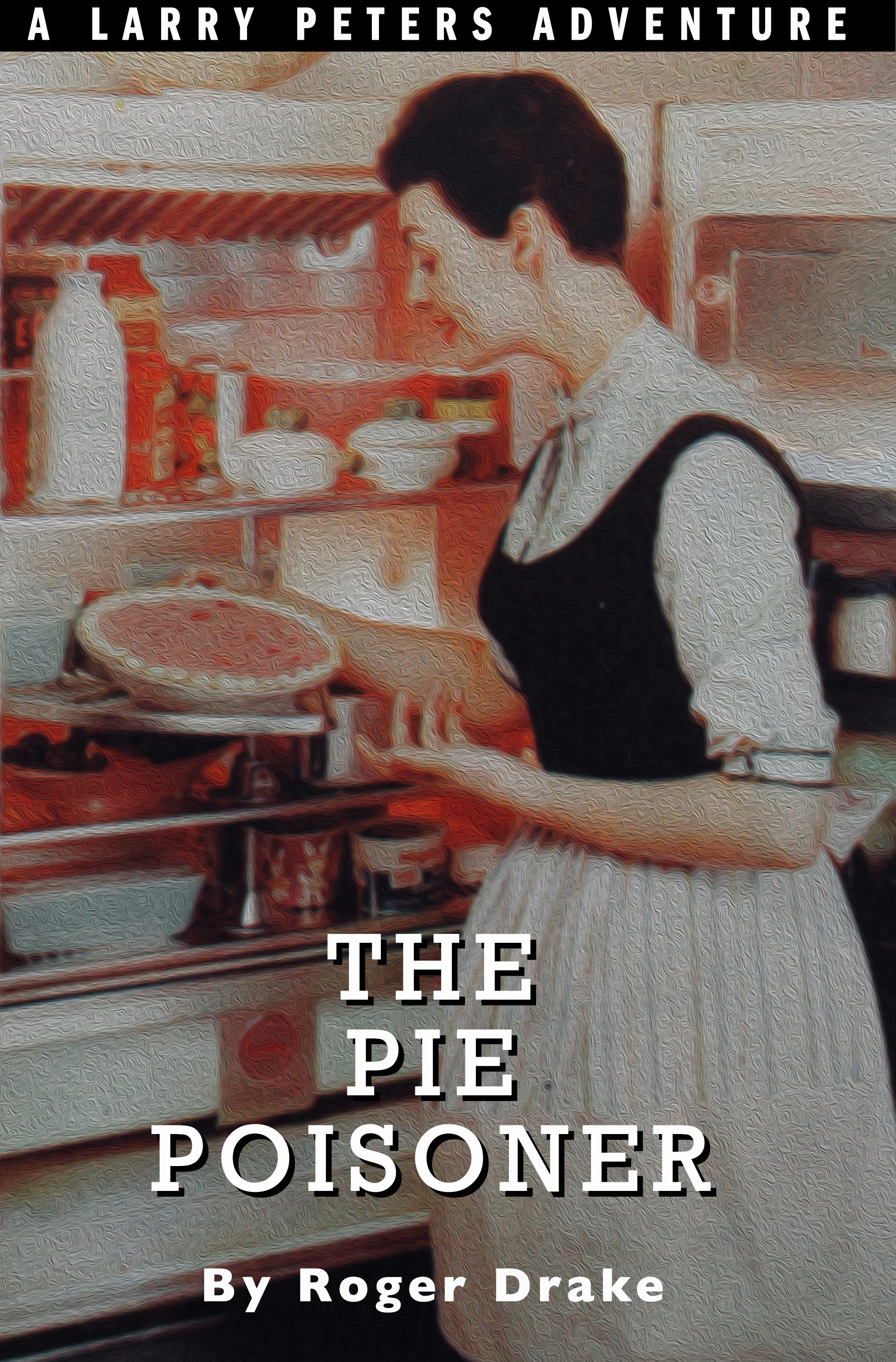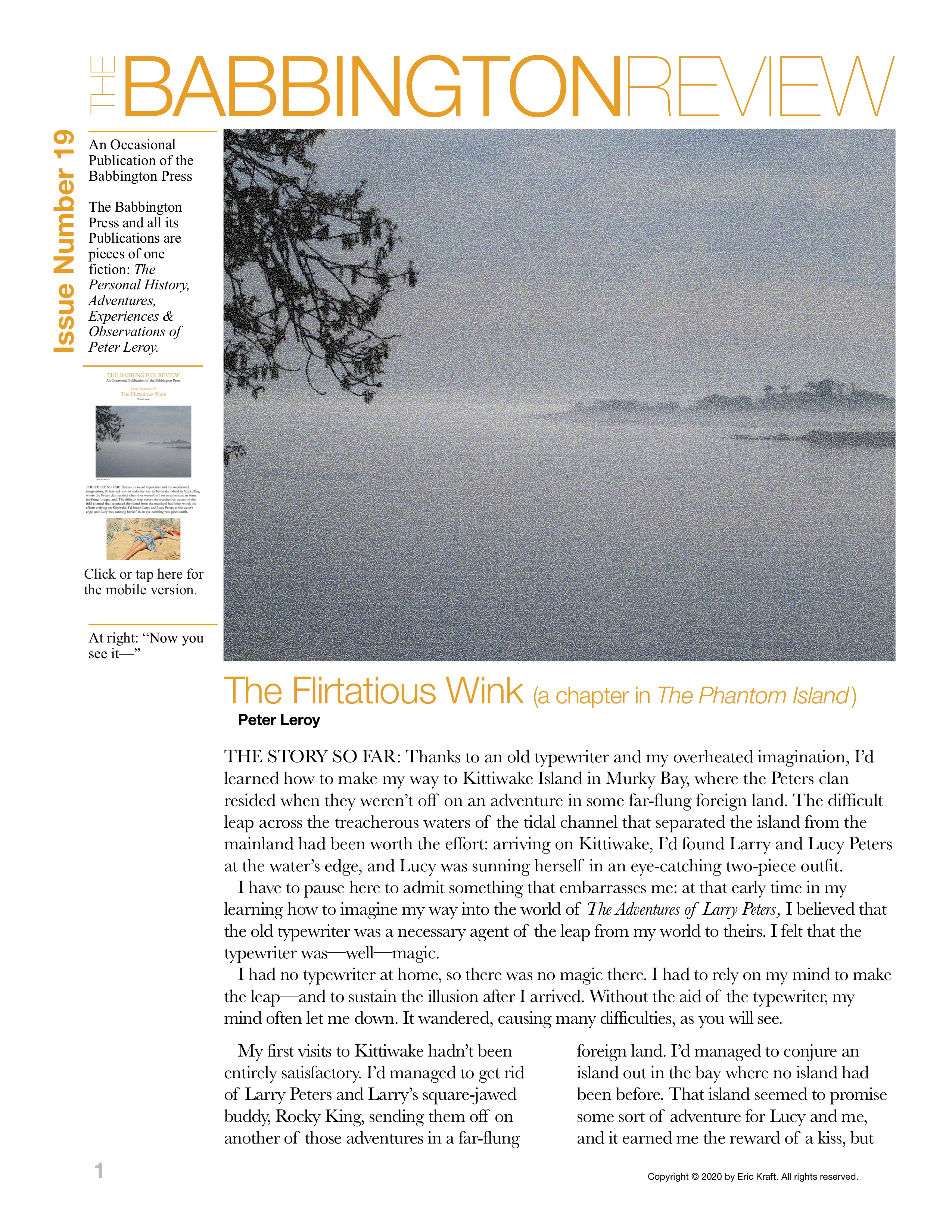THE STORY SO FAR: Thanks to an old typewriter and my overheated imagination, I’d learned how to make my way to Kittiwake Island in Murky Bay, where the Peters clan resided when they weren’t off on an adventure in some far-flung foreign land. The difficult leap across the treacherous waters of the tidal channel that separated the island from the mainland had been worth the effort: arriving on Kittiwake, I’d found Larry and Lucy Peters at the water’s edge, and Lucy was sunning herself in an eye-catching two-piece outfit.
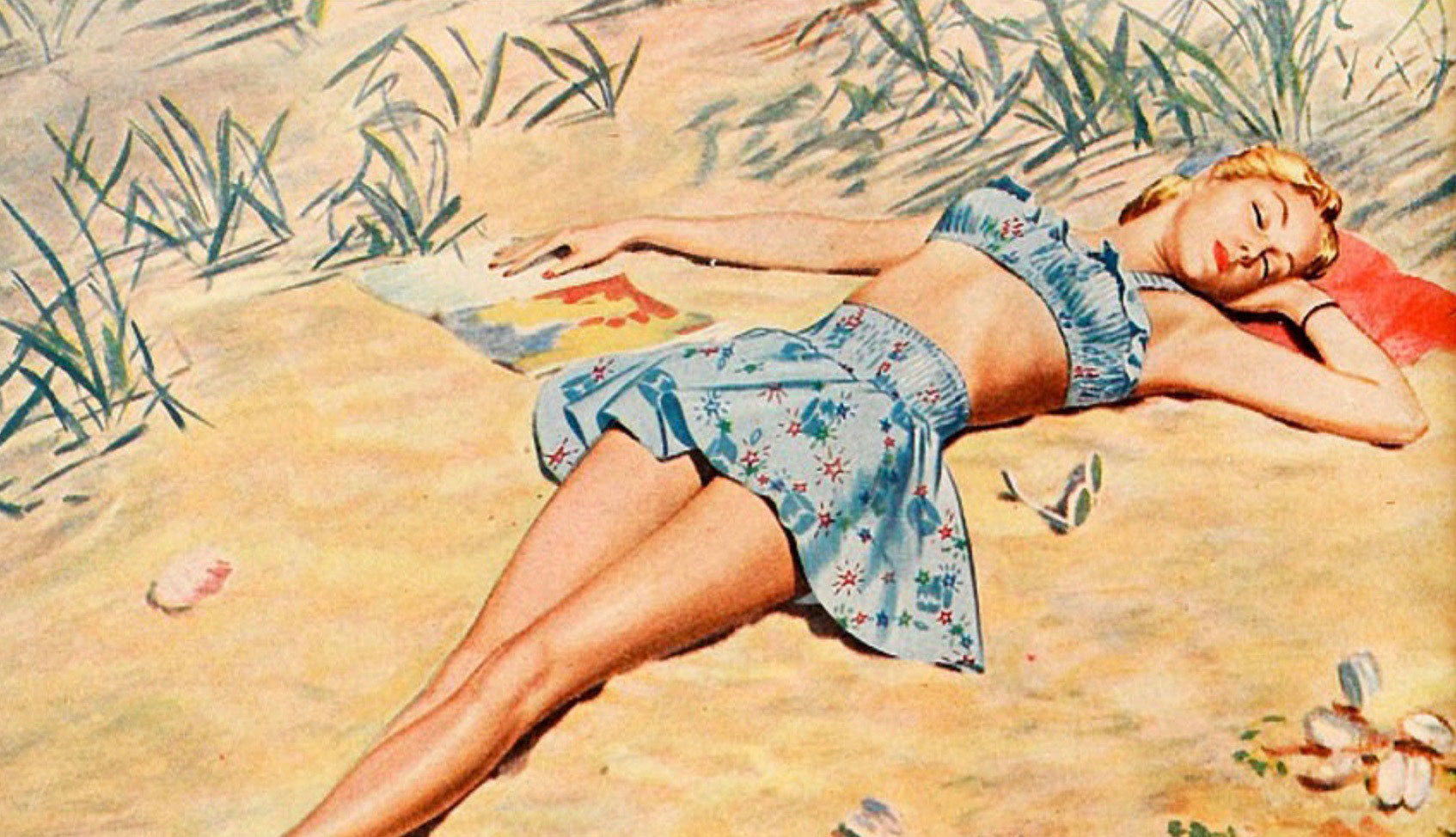
I have to pause here to admit something that embarrasses me: at that early time in my learning how to imagine my way into the world of The Adventures of Larry Peters, I believed that the old typewriter was a necessary agent of the leap from my world to theirs. I felt that the typewriter was—well—magic.
I had no typewriter at home, so there was no magic there. I had to rely on my mind to make the leap—and to sustain the illusion after I arrived. Without the aid of the typewriter, my mind often let me down. It wandered, causing many difficulties, as you will see.
My first visits to Kittiwake hadn’t been entirely satisfactory. I’d managed to get rid of Larry Peters and Larry’s square-jawed buddy, Rocky King, sending them off on another of those adventures in a far-flung foreign land. I’d managed to conjure an island out in the bay where no island had been before. That island seemed to promise some sort of adventure for Lucy and me, and it earned me the reward of a kiss, but then, intoxicated by that kiss, I lost control. I didn’t know what to do next. I needed time to pull myself together. I didn’t make a graceful exit, I just disappeared.
Back at home, in my bedroom in the attic, I gave myself a talking-to, told myself that a kiss was just a kiss, the way a sigh is just a sigh, no big deal. When I felt that I was back in control of myself, I made the leap back to the island at the moment just after she kissed me.
“Where have you been?” she asked.
“Sorry,” I said. “I—ah—wandered off for a few minutes. Don’t be angry.”
“Who said I was angry? I’m not angry. What makes you think I’m angry?”
“You were pouting.”
“People tell me I look good when I pout.”
Adroitly changing the subject, I asked, “What’s new with the mysterious island?”
She stood on her toes and scanned the horizon. I scanned her two-piece outfit, her bare midriff, her legs—
“Hey!” she cried. “It’s gone!”
“Gone?”
“The island is gone!”
She was right. Apparently I couldn’t keep my mind on two things at once.
I held my hands beside my eyes, as blinders, to prevent me from being distracted by her, and I willed the phantom island to return.
“Wow,” she said. “It’s—it’s coming back—it’s emerging from the mist!”
“Great!” I said, and to be honest I was congratulating myself when I said it.
I made the mistake of dropping my hands and glancing at her.
When I turned back toward the island it was beginning to fade again. I gritted my teeth and focused fiercely on it. It began returning.
“Let’s row out there right now,” she said, “before it vanishes again.”
I didn’t know what to do. I liked the idea of our rowing out to the island together, but I was worried that if I was distracted by Lucy’s skimpy outfit, and the bits of Lucy that the skimpy outfit revealed, I wouldn’t be able to maintain my imagination’s hold on the phantom island—and if I couldn’t keep the island and its promise of adventure in front of her, I might lose her interest. If only she weren’t wearing such a skimpy outfit.
“Your outfit—” I said, tentatively.
“Don’t you like it?” she asked, twirling in it, making the skirt rise and my head spin.
“Oh, I like it,” I said, “but—”
“Gee, it isn’t the sort of thing that Larry or Rocky would wear on an adventure, is it?”
“Well—”
“They wouldn’t be caught dead in an outfit like this!” she said with a giggle. “You wait here while I run home and change! Don’t you go vanishing like that island!”
I was surprised to find that I was relieved to watch her running away, toward the large and comfortable old house that had been in the Peters family for three generations. When she was out of sight, I took a deep breath and gave myself some advice.
“Calm down,” I said, pacing the sand at the water’s edge. “Stay in control. Don’t let your imagination run wild. Keep it on a leash!”
“‘Keep it on a leash’!” she shrieked.
“You’re back!” I said. “That was fast.” She was wearing what looked like war-surplus army fatigues and combat boots, and she was accompanied by Hector the pup.
“When you say ‘Keep it on a leash,’ are you referring to Hector? I’ll thank you to remember that Hector is a he, not an it.”
“Hector?” I said. “Leash? It? He? Oh, I see. No, no, I wasn’t referring to Hector. I’d never call Hector an it. Honest. I—ah—I respect him.” I reached out to pet him. He growled.
“Well, okay,” she said, “I’ll take you at your word, and since you respect him so much, I think we should bring him along on our adventure. He might be useful. I guess we would have to keep him on a leash, though. You’re right about that. He’s an inquisitive pup, always getting his nose into things he’s supposed to stay out of. Hmm. He might just get in the way. He’s never been on an adventure. He doesn’t have any experience. Still, it might be nice to have him along—”
Nice for her, maybe, but probably not nice for me. I could easily imagine her cuddling and petting Hector when I’d rather she were cuddling and petting me.
She began cuddling and petting Hector.
I’d lost control again. I felt defeated, inadequate, stupid, and exhausted by the effort of trying to control my imagination, which was always tugging at its leash and getting its nose into things it was supposed to stay out of. I hung my head. I turned and walked away.
Back at home, in my room, I paced the floor. The problem, it seemed to me, was not having a typewriter. If I had a typewriter, I could type the scene with Lucy, create a story that she and I and even Hector would follow. Everything would go as I wanted it to go.
“Okay,” I said to myself. “You don’t have a typewriter. But you have a pencil.” In desperation, I used a pencil to make notes that I intended to expand when I had access to the magical typewriter, but to my surprise, as I scribbled my notes I found myself back on the island.
“What are you writing?” asked Lucy.
“What? Writing? Oh. Writing. What am I writing?”
“That’s what I’m asking. What are you writing?”
“Just—notes—”
“Notes?”
“Notes. I’m absent-minded sometimes. I forget things—so I’m going to take notes—because—”
I was stumped. How could I justify taking notes? I slipped away again, back to my room, where I read what I had so far. I was surprised and disappointed to see that my work was sloppy. My handwriting wasn’t everything it should have been. I copied the notes I’d made—my first draft, though I didn’t call it that and had no idea that I ought to call it that—moving through it word by word, but making changes as I went along. It was the writing equivalent of using tracing paper to improve a drawing that I’d made. In improving my drawings, my goals were to make the drawing more like what it was meant to represent and to make my lines smoother. In improving my drafts, my goals were to make the words more like what I had in mind and make my handwriting neater, or at least less sloppy. This was becoming work—exhilarating, rewarding work, but work. I stopped myself when I was about to throw the older pages away. Although they’d become dispensable, since they’d been superseded, I was afraid of losing what was on them. What if I discovered, after I’d thrown some older pages away, that something I remembered having written earlier was better than what I was writing now? What if there was something important, even essential, back there that I’d forgotten completely but felt the lack of now? Okay. Back to the island.
“Oh! Of course!” said Lucy. “I know! You’ll have to file a full report of our adventure, everything we discover about the vanishing island. Larry and Rocky are always reporting to somebody or other. Come on! Let’s get to that island before it vanishes again!”
We dragged the rowboat down the beach and into the water. Side by side, we began rowing toward the island.
“I wonder if this is actually happening,” she said.
“What—ah—what do you mean?”
“I mean, I wonder whether the island is actually appearing and disappearing or whether someone is controlling our minds, making us believe that it comes and goes when nothing of the sort actually happens.”
“Well—”
“Maybe there’s no island at all!”
“Gosh,” I said, as if the thought had never occurred to me, “do you think that could really be happening?”
“I don’t know,” she said, “but there’s something very mysterious about all this.” She paused, she smiled, and she added, “and there’s something very mysterious about you, too.”
I think she added a flirtatious wink to that.
(I’m being disingenuous. I know she added a flirtatious wink. It made its first appearance in the fourth draft.) |
